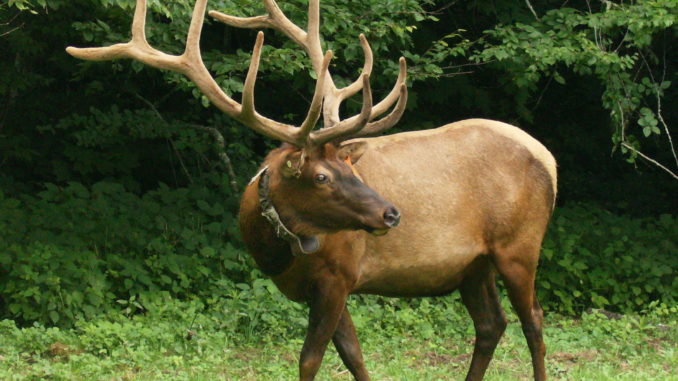
Elk successfully reintroduced 15 years ago
The N.C. Wildlife Resources Commission staff is proposing a hunting season on elk in western North Carolina as a result of a successful reintroduction in the mountains 15 years ago.
The numbers and range of elk have expanded from 52 animals released in the Great Smoky Mountains National Park to an estimated 150 to 200 bulls and cows in the park, on Cherokee tribal lands and on private lands west of Asheville.
At the same time, the non-profit Conservation Fund is buying land in mountains above the town of Maggie Valley for elk habitat. The group plans to convey 1,559 acres to the N.C. Wildlife Resources Commission for game lands for elk and other species. State money is helping pay for the tracts.
The Commission’s staff proposal calls for a permit-only hunt, probably chosen by lottery, in an Oct. 1-Nov. 1 season. If approved, North Carolina would join Kentucky and Tennessee in the Southeast as states with elk hunting.
Justin McVey, a Commission biologist who monitors the elk population, said that before hunting can begin, the herd’s size must be determined to ensure the population can withstand the loss of a few bulls. He estimated about half the population lives in the park and half outside.
Tennessee, with a herd of about 400, opened elk hunting in 2009. This year, the state issued six permits for bulls drawn by lottery from 9,285 applicants. A Fayetteville, N.C., hunter won an auctioned permit with a high bid of $11,101, money that went for elk restoration.
In Maggie Valley, the Conservation Fund plans to convey a 561-acre tract on Sheepback Knob, valued at $2.7 million. Bill Holman, the Fund’s director, said the tract will be conveyed to the Commission in early 2016.
Money for the land came from a $1-million grant in 2014 from the state’s Clean Water Management Trust Fund; $480,000 in federal gun and ammo excise tax funds; $20,000 from the Pigeon River Fund; and private donations.
In addition, the Conservation Fund has lined up two other tracts for $4.6 million to the west between Sheepback Knob and the Blue Ridge Parkway. In November, the Clean Water Fund approved $1.2 million to match $500,000 in private donations and $250,000 from the Rocky Mountain Elk Foundation to begin acquisition of the 783-acre Indian Creek tract. It also gave provisional approval for $1.2 million for nearby 215-acre Mashie Stomp Creek tract.
The three tracts will protect sources of Maggie Valley’s drinking water.
McVey said the forested tracts will be modified to create habitat attractive to elk. He said meadow-like openings will be formed by tree thinning and controlled burns.
Kim Delozier of the Rocky Mountain Elk Foundation, a conservation and hunting group, said the foundation gave $10,000 for habitat work on Sheepback. A former chief biologist for the Smokies, Delozier said bulls imported to the park in 2001-2002 weighed 500 to 700 pounds. The GSMNP said today’s bulls exceed those weights and grow bigger antlers.
A 998-pound bull was killed on US 19 in Maggie Valley earlier this year, one of three elk road deaths there in 2015, McVey said.




1 Trackback / Pingback